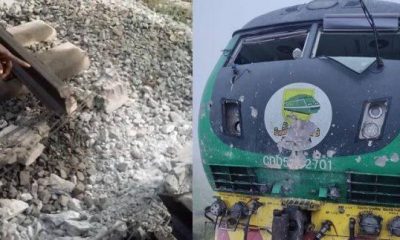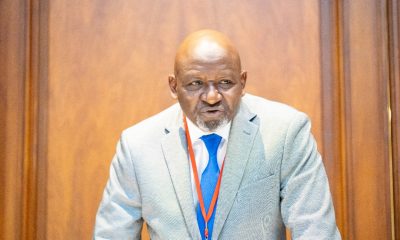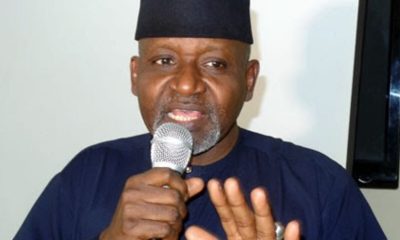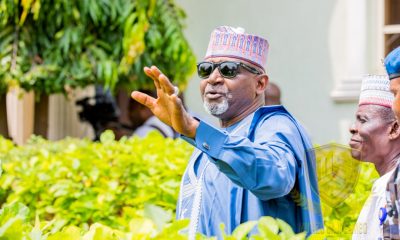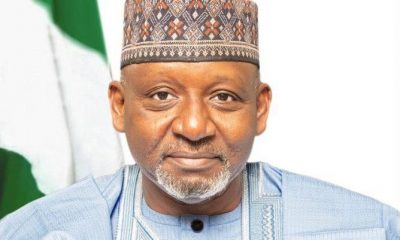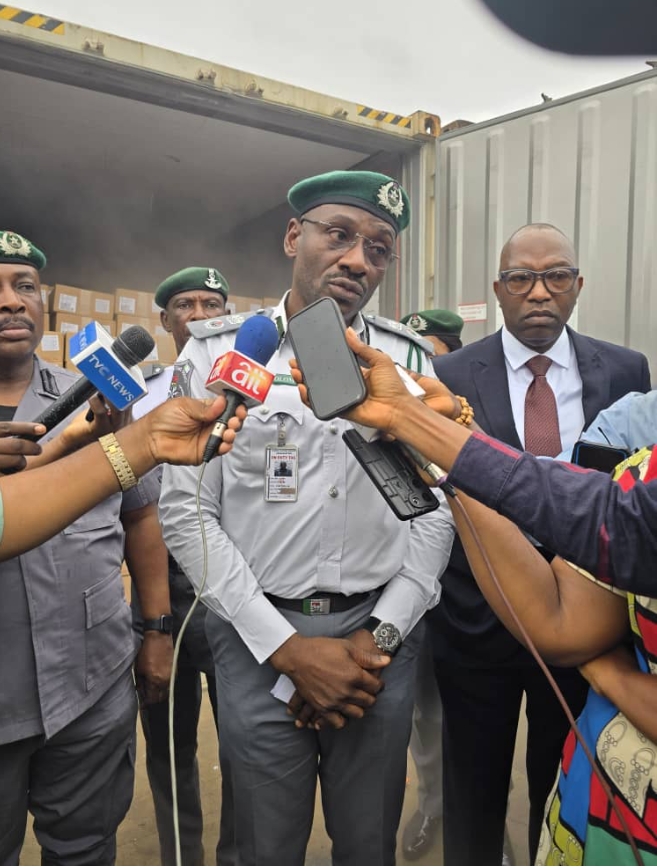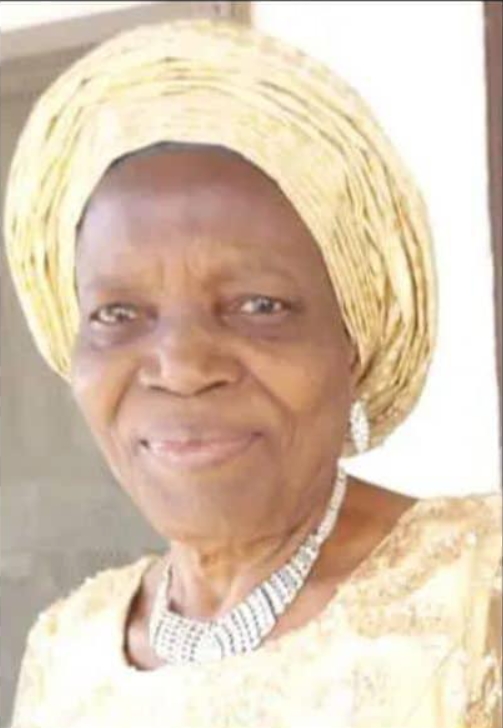Maritime Agencies
INLAND WATERWAYS OF DEATH: WHO IS TO BLAME?
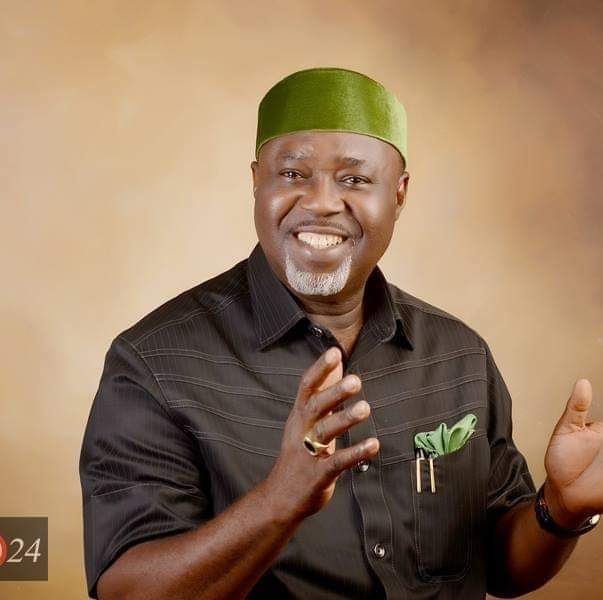
The matter is grim! Every patriot is deeply worried. Whether in Lagos, Yauri, Sokoto, Shiroro, Kebbi or the Niger Delta waters, the increasing loss of lives on the nation’s inland waterways is frightening and can no longer be tolerated. Who actually stands to blame? Who is contributing what to perpetrate what ought to be an exception rather than the rule? Is the carnage persisting because waterway users stubbornly neglect safety measures the National Inland Waterways Authority (NIWA) has been championing for years? What is the level of government empowerment to NIWA to address this matter? Is government allocation sufficient to frontally address such a gargantuan problem? IZUCHUKWU OZOEMENA examines the issue following fresh appeals by the inland waterways regulator recently for all hands to be on deck to check what is becoming a national embarrassment.
August 12 – 14, 2014, the National Inand Waterways Auhority (NIWA) hosted her first-ever International Conference and Exhibition (ICE) in Lagos. Tagged NIWA ICE, it was part of continuing efforts to draw global attention to Nigeria’s huge waterway potentials and efforts the agency was making to harness them not only for the benefit of inland waterway users in-country but stakeholders from contiguous nations and even beyond.
From all indications, the theme of the conference, “Modernizing Inland Waterways Infrastructure and Vessels for Safe and Sustainable Inland Waterways Transportation”remains as relevant and apt, eight years after. This is because it falls in line with the imperatives of the moment and present concerns about increasing safety lapses on the waterways and loss of lives being experienced.
The NIWA ICE focused on safety while vigorously projecting the agency’s strategies to compel boat operators and passengers alike to give topmost priority to safe sail on the inland waterways.
FROM THE BEGINNING
Among other responsibilities, the NIWA Act CAP N47, 2004 of January 1, 1996 which established the agency, vested in it the task to “provide regulations for inland waterway navigation.” Unambiguously spelt out in this task is safety on the inland waterways. To what extent has the agency gone to satisfy public expectations in this regard? What role is stakeholders’ attitude of non-compliance to safety rules playing in making it impossible for NIWA to make substantial strides in ensuring safety on the inland waterways? Does NIWA really stand to blame for continuing loss of lives on the waterways when boat passengers, boat drivers and others blatantly flout safety regulations while plying the inland waters?
The present leadership of NIWA under Dr George Moghalu has been facing scathing criticism for what appears an inability to tame the scourge of numerous boat mishaps. This is despite all efforts by the agency to enforce extant safety regulatory measures. However, some stakeholders say that considering the very wide area whose inland waterways it is overseeing, the agency deserves to be adequately empowered to tackle all tasks including incidences of disobedience to safety rules and regulations. For now, the agency lacks what it takes to adequately prevent or preempt some of these deadly occurrences. It can only react to some of them depending on her capability level which reflects the level of empowerment at her disposal.
Shortly after appointment as NIWA Managing Director, Dr George Moghalu undertook a familiarization tour to coastal states and communities to re-assure all and sundry that contrary to negative notions about travelling by water, it remains the fastest, safest and economically-rewarding means of transportation.
At an enlarged media interaction in Lagos early August, Moghalu was at his best when he made efforts to assure stakeholders that much as it may be humanly impossible to achieve absolute perfection, the agency remains committed to ensure an enduring, secure and safer inland waterways. On recurring boat accidents, he commended the media for reporting this at least to increase awareness on the possibility so that operators can caution themselves on the need to comply to safety regulations at all times. However, he blamed a section of the media for not verifying facts before publishing news on the frequency and casualties. He condemned some boat operators and passengers who treat safety matters with levity.
CHALLENGES
Without doubt, the greatest challenge NIWA is yet to overcome is deviant acts that result to avoidable marine accidents. Majority of accidents occur at night. The agency has to devise a far-reaching monitoring and enforcement strategy, night or day, to remain ahead of boat operators who ply the waterways at unholy hours. Strict enforcement of safety precautions, though already in place, is yet to meet expected standards. This is the reason boat accidents still persist even to a frightening proportion being experienced presently.
Jide Okunola, an Apapa-based freight forwarder stated this recently. Okunola who resides in Igbede riverine area of Ojo, told Falcon Watch that most boat drivers who operate along the Badagry-Ojo-Liverpool-Apapa corridor always have a field day because Police patrols take place during the day only. Therefore, he suggested that NIWA must redesign her strategy by engaging local ‘agboros’ and those he described as ‘repented hoodlums’ because “it takes a thief to catch a thief”. According to him, they are already familiar with the terrain and can be very useful in monitoring who is doing what on the waterways especially at night.
These people can be offered incentives to volunteer information because they are on ground more than the Police. Night journeys are common. Nobody checks what happens along the waterways at night”, Okunola regreted. He said that along the stretch, intensive fishing happens in the night; movement of smugglers also take place at night and nobody is available to question those involved. People involved in this act care less about light, wrecks and other obstructions that can cause mishap. Of course, they understand the local geography and can avoid obstacles even in the dark.”
He advised NIWA to realize the need to obtain valid information about what goes on along this stretch through devising a subtle means to identify and befriend some of these night operators so as to have access to needed intelligence on unauthorized night voyages. If this strategy works out on this corridor, he explained, it can be replicated in other areas.
Okunola regretted that all talks about life jackets means nothing to the locals. “In fact, as they rush out to fish at night or scoop sand during the day, life jackets do not matter. For smugglers, the motive is to make it quick. Nothing else is relevant.”
Falcon Watch recalls that at an enlarged stakeholders’ meeting in 2020, Dr Moghalu stated that his cardinal objective was to make water transportation a transport mode of choice. He reiterated this in Lagos recently. “We have tried to provide the needed environment for operators, including training programmes, to expose them to operational standards. Yet, some have chosen the path of desperation and dangerous behavior leading to loss of lives and property.”
MENACE OF WATER HYACINTH
The menace which water hyacinth, the stubborn weed constitutes on the waterways is enormous. This directly impedes navigation for all kinds of vessels. In areas where she has supervisory statutory responsibility, NIWA clears this stubborn weed, Moghalu says.
Following the seasonal embarrassment this weed causes to navigation, NIWA and Lagos State Waterways Authority, LASWA, in 2017, concluded plans to promptly clear it at all times.
At a 2017 joint stakeholders’ meeting with members of the Association of Tourists, Boats and Water Transportation of Nigeria (ATBOWATON) in Lagos, then NIWA Lagos Area Manager, Engr Muazu Sambo admitted that water hyacinth was a critical problem hindering the Agency’s operations. Muazu Sambo who is the current Transportation Minister disclosed that NIWA had acquired equipments to clear it on a permanent basis. “We have acquired equipments to clear water hyacinth; we will deploy them for the purpose,” Sambo said.
INTERVIEW WITH DR GEORGE MOGHALU (in-box)
Q: Frequent boat accidents have become NIWA’s greatest challenge. Does it mean your safety arrangements are not working?
A: We’re doing all what we are expected to do to manage the waterways. But it is sad enough that you find that either by acts of commission or omission, people do not do what they are expected to do. For example, we have placed protocols that vessels don’t move in the night; they don’t move in the early hours of the day. From statistics and reports we receive on accidents that happen, 90% of such accidents happen in the night or early in the morning. What that goes to show is that these vessels don’t have navigational aids. Therefore, they should not move in the night or when it is dark. But people still move in the night. They will avoid the right jetties. At times, they don’t even move from jetties at all; they don’t move at river banks. They move from their vessels, get into the water and expose people to danger. You can’t just leave any of our jetties on your own without being tracked. These jetties are monitored and there are rules that must be obeyed. You cant just get onboard any of our jetties without being fully kitted among which is wearing the right life jacket. Most people don’t even know that these jackets expire. You can’t have an expired life jacket from any of our jetties. You can’t ply from any of our jetties when you are not properly kitted. But to avoid all these, they take people and put them on vessels and expose them to unnecessary and avoidable danger when they are not properly kitted.
Q: People say this is happening because NIWA has not been stringent in punishing offenders by catching and prosecuting them…….
We’re getting them….. We arrested people and tried them. Some people have been convicted. We are still doing that. Even we impound substandard vessels that shouldn’t be on the waterways. We get such vessels; some are destroyed. We keep doing that because every lfe is important to us. We don’t want the waste to continue.
Q: NIWA’s ex-top Manager, Engr Muazu Sambo, is now the Transportation Minister. Do you expect an improved treatment of NIWA matters especially strict enforcement of safety regulations which he championed in the past?
We are always serious and concerned about enforcement of safety standards. We are doing verything to push and actualize them. But don’t forget that much as he was our former staff, he is now the Federal Minister of Transportation and other paratatals are under him. It is not only NIWA that he is overseeing.
Q: The Onitsha River Port was recently concessioned. What is the position of this very large parcel of land and vegetation in the channel directly overlooking the port?
It’s an island; it’s not a bush. We have one or two Chinesecompanies discussing with us on the possibility of developing it.
Q: Still on safety and standards and the need to curb recurring boat mishaps. Any plans on waterway transport codes and standards?
We are putting up transport codes and standards; setting up a task force. Any defaulter we catch we hand over to the Police to prosecute. We are not leaving anything to chance because this is embarrassing. Every life is important to us. The rules area made to be obeyed.
Q: What is the place of technology in all these?
Like you heard me say, boat registration is now done online. We are trying to use technology as much as we can. The next stage is to station cameras to be able to monitor activities on our waterways. So, technology has a key role in all we do.
Q: You brought out some patrol vehicles as well as instituting a task force. What are you doin g to ensure that rules are not only adhered to but operators are abreast of the law?
We are engaging operators. We have created fora where we meet and discuss. A lot of sensitization is going on across the country. Like you said, we bought and distributed patrol vessels .We are empowering and giving all the support to our Police department. We are also setting up task forces that are working across the country to effect protocol when it has to do with boat management.
Q: It appears managing the long stretch of inland waterways across Nigeria is a daunting task for NIWA. Do you support views that it is time the agency is unbundled into three or four zones for easy surveillance and monitoring?
Why unbundle it? We already have too many agencies. We have departments in NIWA that are living up to their responsibilities and expectations in this regard. So, I don’t see why NIWA should be unbundled. I don’t think it is necessary.
Customs
Ogun 1 Customs Hosts FAED 2026, Highlights Gains of Cross-Border Cooperation, Economic Empowerment and Entrepreneurial Development.
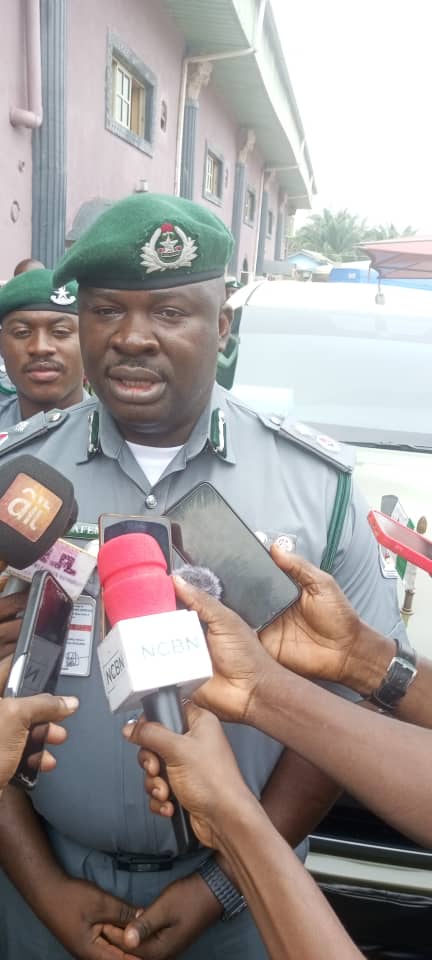
By Izuchukwu Ozoemena
The Acting Customs Area Controller (CAC), Ogun Area 1 Command of the Nigeria Customs Service, Deputy Comptroller O.O.Afeni says the Festival of Arts For Economic Development (FAED) continues to reflect a shared understanding that sustainable border management goes beyond enforcement to encompass cross-border cooperation, economic empowerment and entrepreneurship development within the border communities.
Deputy Comptroller Afeni spoke at the Idiroko Border, Thursday, while declaring open the international colloquium to mark the 5th edition of the Festival of Art for Economic Development to which the Nigeria Customs Service is a strategic partner.
He said: “The theme, ‘Rebranding Borderline Communities through Creative Empowerment and Entrepreneurship,’ aligns with the Nigeria Customs Service’s commitment to supporting legitimate trade, encouraging value addition, and promoting small-scale enterprises as drivers of economic growth and border stability.
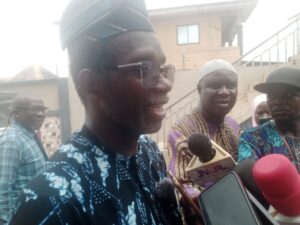
Dr Bonny Abisogun Botoku, Executive Producer, FAED.
He acknowledged the important role of the Nigeria–Benin Inter-Border Forum, under the leadership of its Permanent Secretary, Dr. Bonny Abisogun Botoku in advancing preventive diplomacy, structured dialogue and operational cooperation between Nigeria and the Republic of Benin.
”Through the empowerment programmes and entrepreneurship initiatives embedded in this Festival, we see practical pathways to reducing illicit activities, strengthening lawful commerce, and fostering inclusive economic opportunities for our people.”

Deborah Chiamaka Nwangene, one of the graduating trainees.
”The Nigeria Customs Service remains committed to partnerships that promote peaceful borders, resilient economies and sustainable regional integration.”
During a brief press chat, Comptroller Afeni spoke about enforcing government fiscal policies, saying that this must not be by force.
”The citizens must be made to know the reasons we are here. This is a way of showing the communities that we care about them. You can see that we have trained some people in the art of garri- making painting tye and dye (adire), etc. It’s a way of empowering the community.”
On suggestions that the seminar is capable of deepening cordial relationship between Benin and Nigeria, the CAC could not agree less.
”It is the fifth edition. It has been a situation we see the succeeding version getting better than the previous one. Today, I signed many certificates of people graduating. We’re not just training them; we’re empowering them so that we take them off the smuggling realm and make them better citizens.”
In his presentation, the Executive Producer of the Festival, Dr Bonny Abisogun Botoku described it as more than an event.
”It is a movement. It is a statement of belief—that border communities are not problems to be managed, but potentials to be unlocked.”
He recalled that for too long, border communities across Africa have been spoken about only in the language of risks exemplified in smuggling, insecurity, informality and marginalization.
”But those of us who live and work at the borders know a deeper truth. Borders are not just lines on maps. They are meeting points of culture, gateways of trade,
and spaces of shared history.
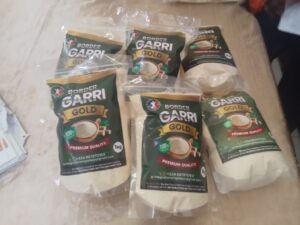
Sample of garri processed and packaged by a trainee.
”The Nigeria–Benin border is not a dividing line—it is a shared civilization. What we are doing through this Festival is to change the story from suspicion to trust, from survival to enterprise,
from isolation to integration.
Contrary to the widely-held belief that culture only concerns entertainment, he explained, culture is power, identity and economic capital.
”Through art, music, fashion, crafts, food systems, and storytelling, communities rediscover pride, cohesion, and voice.
Culture becomes a language of peace, dialogue, and diplomacy—especially in border spaces where differences must be managed with wisdom.
”This Festival deliberately places culture at the center of development, not at the margins.”
Distinguished guests at the event included the Onitaege of Itaege, HRM Oba Matthew Ademola Abisoye and other respected traditional rulers, government officials and representatives of security agencies. Others were partners from the Republic of Benin, artists, cultural practitioners and trainees.
Maritime Agencies
We’re Ever Proactive In Intercepting Prohibited, Falsely Declared Goods, says Controller Onyeka.
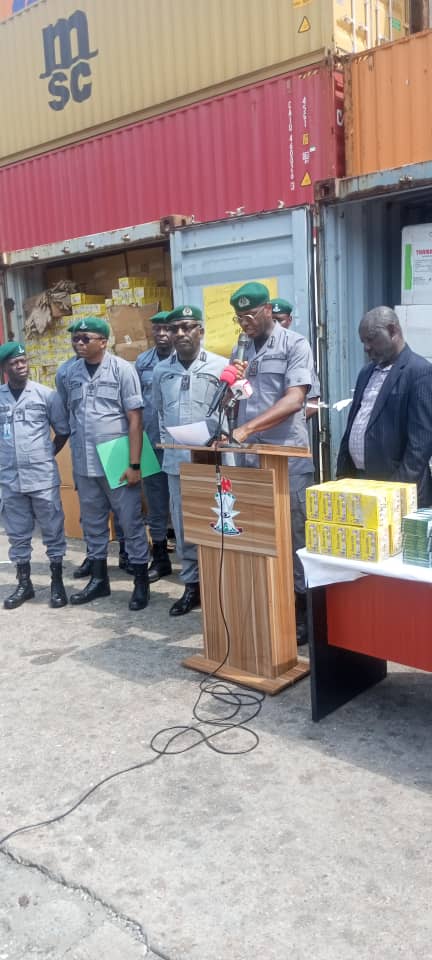
By Izuchukwu Ozoemena
In line with the core mandate of the Nigeria Customs Service, the Tincan Island Port Command is ever proactive in intercepting prohibited and falsely declared goods even as it remains committed to facilitate legitimate trade while contributing significantly to revenue generation.
The falsely declared goods include controlled pharmaceuticals, arms and ammunition, narcotics and other items capable of undermining public safety, security and stability.
The Customs Area Controller (CAC), Comptroller Frank Onyeka stated this in Lagos, Friday, while formally handing over three (3) units of 20 ft containers containing expired pharmaceutical products to the National Food and Drug Administration and Control (NAFDAC) for appropriate regulatory action.
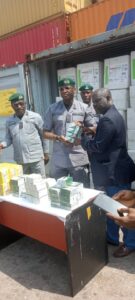
”The containers include two units with numbers PONU031958/6 and MSKU 711656/0 which were found to contain expired Tramadol tablets,” Onyeka announced.
”These consignments were thoroughly examined and the result revealed that the first container contained 86 cartons of Vingil Tramadol BP 50 mg while the second container held 250 cartons of the same expired Tramadol product”.
”The third container with number MSKU413519/1 was found to contain 370 cartons of expired Declofenac Sodium BP 50 mg tablets without a valid NAFDAC registration number, making the consignment illegal and dangerous for public use.”
Beyond these seizures, he explained, the Tincan Command has continued to record notable achievements in recent times through intensified cargo examination, improved intelligence gathering and sustained enforcement operations. These achievements are the result of deliberate strategies anchored on discipline, integrity and strong inter -agency collaboration.
He showed special appreciation to the operatives of NAFDAC for their consistent cooperation.
”Our synergy has continued to yield positive results particularly in ensuring that fake, substandard and expired drugs are intercepted before reaching the Nigerian populace.”
He equally commended officers and men of the Command for being resilient and committed to duty, a development that has continued to strengthen the credibility and operational effectiveness of the Command.
”Furthermore, I express our sincere appreciation to the Comptroller-General of Customs, Bashir Adewale Adeniyi, PhD, MFR, psc (+) for his purposeful leadership and strategic reforms which have empowered our operations.”
The CAC later handed over the prohibited pharmaceuticals to Mr Kareem Taiwo Adekunle, the Chief Regulatory Officer (Investigation and Inspection Directorate), NAFDAC, Apapa.
Maritime Agencies
Zone ‘A’ Coordinator, Mohammed Babandede, Visits Apapa Command, Commends Officers’ Sterling Performance.
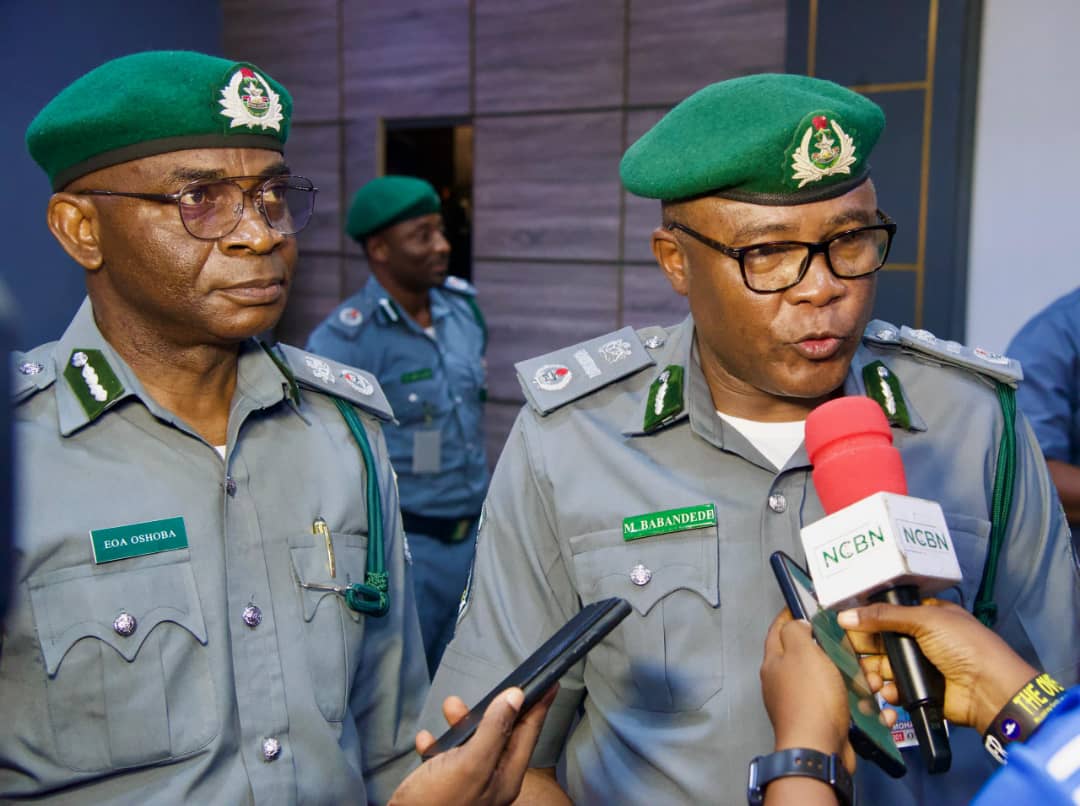
By Izuchukwu Ozoemena
Officers and men of the Apapa Customs Command have received a special commendation for maintaining an exceptional performance in revenue generation, anti-smuggling operations and trade facilitation throughout 2025.
Mohammed Babandede, Assistant Comptroller-General of Customs (ACG) and Zonal Coordinator, Zone ‘A’ of the Nigeria Customs Service handed down the commendation during his familiarization visit to the Command, Thursday.
Chief Superintendent of Customs, Isa Sulaiman, the image maker of the Apapa Customs Command disclosed this in a press release.
Addressing officers and men during the visit, the image maker stated, the Zonal Coordinator explained that the purpose of his coming was to acknowledge the operational challenges faced by the Command, appreciate its notable achievements and further boost the morale of personnel who have consistently surpassed expectations, particularly in revenue collection where the Command exceeded its annual target.
”The ACG also lauded the Command’s sustained anti-smuggling efforts, especially the significant seizures of narcotics and other illicit substances including cocaine and tramadol, describing these interceptions as critical contributions to national security, public health and societal safety. ”
Effective enforcement, the ACG emphasized, remains fundamental to creating a secure environment for legitimate trade to thrive.
While noting that the core responsibilities of the Service extend beyond revenue generation to include national security, public safety and trade facilitation, the Zonal Coordinator commended the Apapa Command for its effective inter-agency collaboration. He urged officers to deepen cooperation with sister agencies, particularly in the deployment and promotion of trade facilitation tools that have positioned the Service at an upper-class operational rating.
The Zonal Coordinator further stressed the importance of integrity, reputational management, mentorship and capacity building within the Command. He urged senior officers to transfer knowledge and experience to younger officers while also drawing attention to the importance of officers’ welfare and health, disclosing that drug tests would be conducted across Commands. He advised officers to remain health-conscious for effective service delivery.
In his remarks, the Customs Area Controller, Apapa Area Command, Comptroller Emmanuel Oshoba, expressed appreciation to the Zonal Coordinator whose February 5 visit was motivating and timely. He reaffirmed the Command’s commitment to sustaining its performance in revenue generation, enforcement, trade facilitation, inter-agency cooperation and ethical conduct in strict adherence to the Nigeria Customs Service Act, 2023 and the policy thrust of the Comptroller-General of Customs, Dr Adewale Adeniyi.
-

 Customs2 weeks ago
Customs2 weeks agoFreight Forwarders Warn FAAN To Halt New Charges In Airport Cargo Operations or Risk Rumble in the Sector .
-
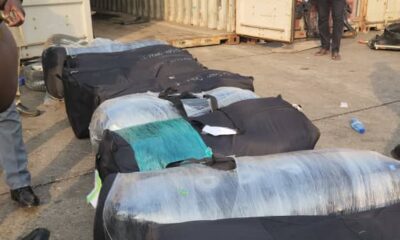
 Maritime Agencies3 weeks ago
Maritime Agencies3 weeks agoWAR AGAINST KILLER DRUGS: Apapa Customs, NDLEA Collaborate To Nab Huge Quantity of ‘Canadian Loud’.
-

 Customs3 weeks ago
Customs3 weeks agoLekki Deepsea Port: The Success Story of the Nigerian Ports Authority.
-
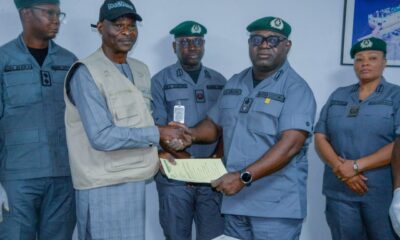
 Customs3 weeks ago
Customs3 weeks agoPTML Customs Hands Over Seized Arms and Ammunition, Collects N44.06bn in January.
-
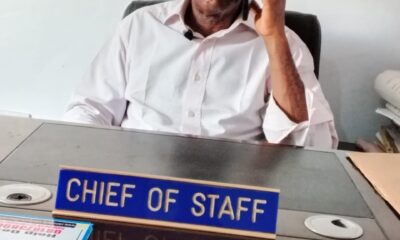
 Maritime Agencies3 weeks ago
Maritime Agencies3 weeks agoNAGAFF Compliance Team Set to Relaunch for Stronger Engagement, Enforcement.
-
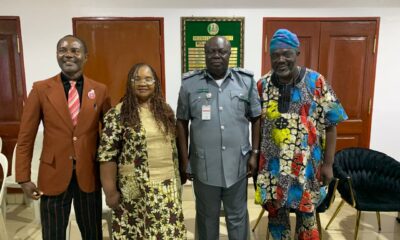
 Maritime Agencies3 weeks ago
Maritime Agencies3 weeks agoSeme Customs Raids Hideouts, Impounds 200 Bags of Smuggled Rice, Collects N2bn 3 Weeks into 2026.
-

 Maritime Agencies2 weeks ago
Maritime Agencies2 weeks agoNAGAFF Pledges Watertight Enforcement, Unveils A More Formidable 100% Compliance Team.
-

 Maritime Agencies2 weeks ago
Maritime Agencies2 weeks agoLekki Deepsea Port: The Success Story of the Nigerian Ports Authority.


